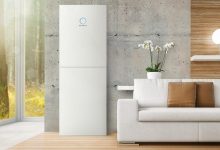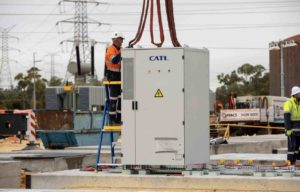German battery manufacturer sonnen has announced a new program to pay customers for helping to provide grid stability services, with Australia to be the first location for the launch of a new virtual power plant initiative called sonnenConnect.
Sonnen, now owned by oil giant Shell, says customers will receive a financial benefit, through cash payments, if they allow their sonnen branded home batteries to participate in the company’s new virtual power plant that has been designed to provide frequency control services.
Through the program, sonnen will aggregate the company’s battery systems to provide grid stability services in the National Energy Market, including participation in FCAS markets. The program will only draw upon a small portion of each customer’s battery storage capacity, with a minimum of 4kWh, to provide the grid stability services.
“This is about making smart energy systems even smarter,” CEO of sonnen Asia Pacific Nathan Dunn told RenewEconomy.
“Customers added solar panels to their homes because it was the smart choice to reduce costs. They added battery storage because it was the smart choice for energy independence, and now adding sonnenConnect is the smarter choice for helping support grid stability.”
Dunn says that the product has been developed in Australia, and the local regulatory regime, which he says is more open to the establishment of virtual power plants, had been key to its development, along with the high uptake of battery storage systems.
“Sonnen connect was a product developed locally and will likely be a product that ultimately drives behavioural change globally,” Dunn said.
“With the growing uptake of rooftop solar and home batteries globally, utilities are recognising the importance of home batteries in Frequency Control Ancillary Services (FCAS) or what is known as demand response, to stabilise the grid when there is a surge in the demand for electricity.”
“Through sonnenConnect, we are rewarding customers who are providing us access to their sonnenBatterie when needed for demand response. sonnenConnect provides our home battery owners with an additional revenue stream which allows them to continue to receive a feed-in tariff from their energy retailer,” Dunn added.
“Not only will they enjoy being energy independent, sonnenBatterie owners are working together as a community to stabilise the energy grid that connects millions of homeowners in the National Electricity Market.”
To be eligible to participate in sonnen’s rewards program, households will need to have one of sonnen’s batteries installed, with at least 4kWh of capacity. No additional equipment will be required to allow batteries to participate in the program, with sonnenbatterie products already incorporating the necessary control systems.
Households will need to sign an agreement to participate in the rewards program, but will be able to remain with their chosen electricity retailer and benefit from any existing feed-in-tariffs. Sonnen said that they only expect to draw upon a small portion of each battery’s capacity, and participation in the program would not leave households without access to storage capacity as they needed it.
“We’re not making an onerous dip into the customer’s battery. We will never leave them without enough battery capacity to use themselves,” Dunn told RenewEconomy.
Sonnen estimates that residents in New South Wales and the ACT could be credited with up to $41 per month under the rewards program, with residents of South Australia, Victoria, Queensland and Tasmania expected to benefit by around $24 per month. Customers will also receive a one-off $100 bonus when signing on to the program.
The higher benefits in New South Wales and the ACT reflected the higher penetration of sonnen products in those regions, and the company may look to adjust the fees as uptake across the other states continues to grow.
The German-headquartered sonnen has made a significant push into the Australian market, establishing a manufacturing base at a former Holden factory in Adelaide. Sonnen was acquired by Royal Dutch Shell in early 2019 as part of the oil giant’s own push into the clean energy market.
Dunn told RenewEconomy that sonnen would continue to look to build upon the company’s hardware and software innovations in the energy storage and electric vehicle space.
Dunn added that while sonnen had the global capability to launch a number of services for electric vehicles, including charging and vehicle-to-grid capabilities, growth in the uptake of electric vehicles in Australia would be the main deciding factor of whether those services will be launched locally.
In Europe, sonnen already offers the sonnenDrive product, which provides a subscription-based service that includes the supply of an electric vehicle, but the service has not yet launched in Australia.










